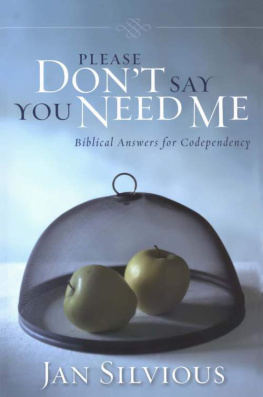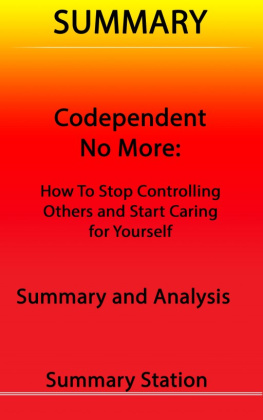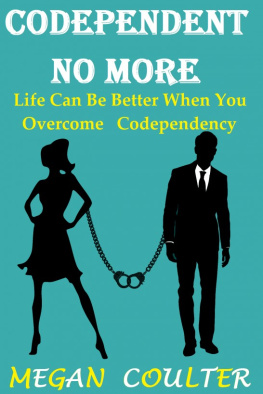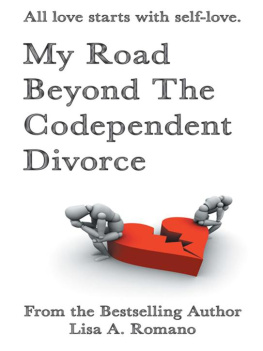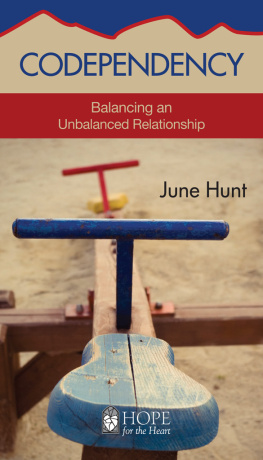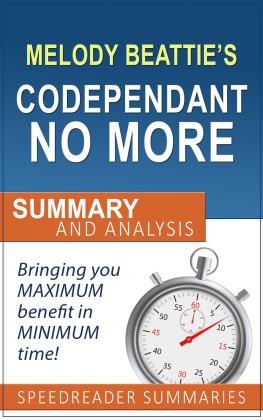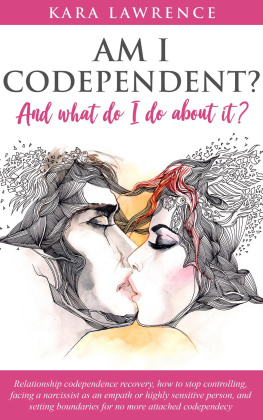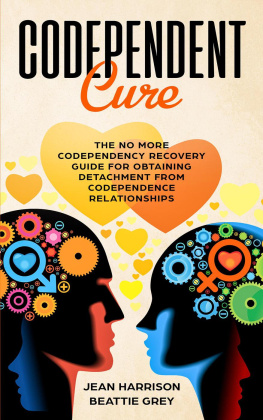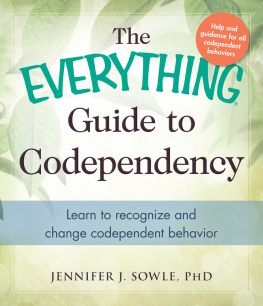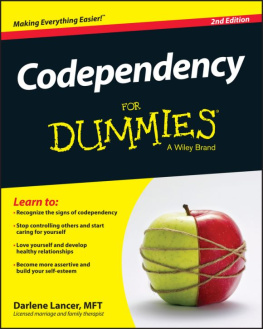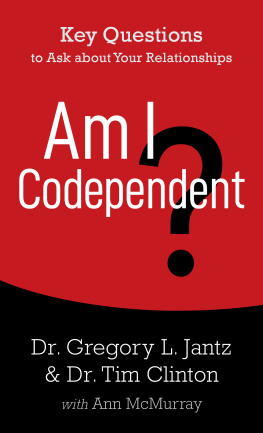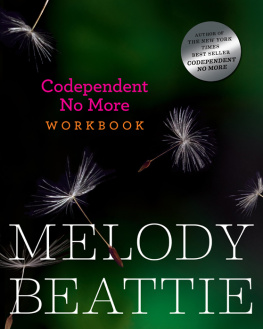Dedicated
to
Debra Martin, who faithfully challenged me to soar
even when I had wounded wings
to
Carolyn Capp, who consistently encouraged me to keep going, and gently helped me do it
and to
David, Jonathan, and Aaron,
who have given me my lifes greatest joy
being their momma.
Dear Reader,
As you begin to read Please Dont Say You Need Me, I ask you to do two things
(1) Pray that God the Holy Spirit will lead you into truth as you encounter new thoughts and concepts.
(2) Put aside your preconceived ideas about the topic of codependency.
I have read codependency experts from many arenas and have found they share a common bond: the inability to clearly define codependency. According to Anne Corwin, a specialist in the field, Codependency is not a new disease, but it has only recently been named. This label was applied in 1979.
So, in the light of this confusion, I think it is important to establish definitions that will apply to this book alone. I have developed these definitions and am spelling them out at this point so you might have a clear point of reference from the very beginning.
CODEPENDENCY: Throughout the book you will encounter a situation called codependency. This is a relationship between two people who allow one anothers behavior to profoundly affect each other. In an attempt to feel good about himself, one will try to control the physical, emotional, and spiritual behavior of the other. The other will compromise physical, emotional, and spiritual well-being for the sake of the one.
THE EMOTIONALLY DEPENDENT PERSON: This is the individual in the relationship who is the primary dependent. This person views connection to another person as the essential source for his self-esteem and security. This is the weaker of the two people in the relationship who leans on the stronger, yet controls the stronger with his manipulation and his great neediness.
THE CODEPENDENT PERSON: This is the individual in the relationship who is stronger but easily controlled by the neediness of the weaker, emotionally dependent person. The codependent will compromise his own well-being to meet the needs and to protect the feelings of his leaning, emotionally dependent family member, friend, or co-worker.
For the sake of clarity, I have tried to specify the differences between emotionally dependent and codependent throughout the book. If there is a situation where delineation is not applicable, the words dependent or dependency will be used.
After a while you learn the subtle difference Between holding a hand and chaining a soul,
And you learn that love doesnt mean leaning And Company doesnt mean security,
And you begin to understand that kisses arent contracts And presents arent promises,
And you begin to accept your defeats With your head held high and your eyes open,
With the grace of a woman, not the grief of a child. You learn to build your roads
On today because tomorrows ground Is too uncertain for plans, and futures have
A way of falling down in midflight. After a while you learn that even sunshine
Burns if you get too much, So you plant your own garden and decorate
Your own soul, instead of waiting For someone to bring you flowers.
And you learn that you really can endure, That you really are strong
And you really do have worth And you learn and learnand you learn
With every goodbye you learn.
author unknown
1
Whats Wrong with Me?
CASE ONE
My telephone rang at 10:00 P.M. The sad voice was too familiar. In half-apologetic, half-desperate tones she said, You have got to tell me if Im going crazy.
For nine years, my friend Margaret had called periodically to say her adulterous, abusive husband was once again trying to charm his way into her affections while continuing to live in adultery with his secretary. All it took from him was a kind word or a tender touch, and momentarily, the rage within her was silenced as she hoped against hope that maybe this time they would salvage their marriage.
During their lives together, he had threatened her, lied to her, abandoned her, and been unfaithful to her. Yet whenever I would suggest that we are not intended to live continuously in such relationships, she would whimper, But, if I dont have him, Ill be all alone. Just having him part of the time is better than not having him at all.
For years her drama has had the same story line. He cheats, she gets angry and threatens to leave. He repents with sweet words and plays the role of devoted husband. She convinces herself he has changed. He cheats, she gets angry, and the cycle starts all over again. Each time, her spirit dies a little more, and yet she cant find a way of escape.
CASE TWO
The attractive businesswoman took me by surprise as she told the bizarre tale of chasing her roommate around the block, begging her to come home after they had quarreled. Lynn poured out her feelings of rage and disappointment about her friend Diane.
Lynns childlike brown eyes looked pouty as she detailed Dianes inconsiderate actions toward her. This roommate, with whom she had shared everything, was slighting her, spending too much time with another woman at work. Their frequent arguments always seemed to be ignited by the failure of one to meet the others need for companionship. The weekend had been a repetition of so many others.
Lynn had wanted the two of them to go to a movie, but Diane already had made plans with her friend at work. The nagging and accusations began, and in an outburst of frustration, forty-year-old Diane stormed out of the house, vowing never to return. Lynn ran out after her, begging her to talk. Through tears, Lynn promised that she would be better if Diane would just come home.
CASE THREE
Many years ago I met a wonderful friend. We clicked immediately. We enjoyed doing many of the same things. We loved to talk and dream, and we liked the way our friendship felt. It became a real comfort zone for both of us. Whenever I needed to talk, she was there. Whenever she wanted to go somewhere, I went with her.
The easy camaraderie and the heady feeling of immediately becoming best friends flattered our egos. My friend needed me and I loved being needed. Every protective, encouraging thing I did was received as a precious gift. Her gratitude was unending, and I loved it.
Then one day things changed. I can still remember the dark cloud that quietly floated across my comfort zone. Someone else had come on the scene. She was bright, bubbly, and loved to do fun things with my friend. It soon became evident that I was not needed very much anymore.
At first my reaction was one of slight annoyance, similar to the response you have to the buzzing of a mosquito in your ear. Then my feelings became irritated. The irksome bug had bitten me. As the welt of anger and irritation grew, I realized I had been attacked by jealousy. That made me furious with myself and even more furious with my friend and her friend. Soon the welt was scratched raw and a full-blown infection set in. It didnt take long to spread, and ugly open sores appeared for all to see. The healing of those infected areas took a long time because the jealousy episode was just one of many irrational, destructive scenes to be played out in our relationship.
Today, the sores are healed, but the scars remain as silent reminders of an agonizing time when a relationship controlled my emotions and consumed energy that should have been more profitably given to other relationships and activities.
CODEPENDENCY

